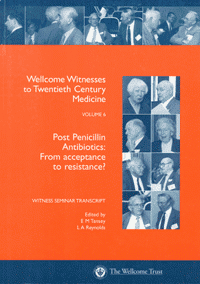Post Penicillin Antibiotics: From acceptance to resistance?
 The introduction of penicillin during the Second World War led to a revolution in both drug development and therapeutics. Several important themes emerged during the course of the meeting – the discovery of the antimicrobial effects of actinomycetes, streptomycin as specific therapy for TB, scientific research in pharmaceutical company laboratories and the mechanisms whereby the products of that research were manufactured, marketed and utilized in the clinic, the increasing recognition of the clinical successes and the subsequent problems of antibiotic resistance, and the discovery of the mechanisms that transferred resistance. Participants include: Dr Ralph Batchelor, Sir John Crofton, Professor Naomi Datta, Dr Peter Doyle, Professor Harold Lambert, Professor D A Mitchison and Professor Gordon Stewart. Introduction by E M Tansey, vi, 71pp, 2 tables, 1 table of chemical structures, subject and name index.
The introduction of penicillin during the Second World War led to a revolution in both drug development and therapeutics. Several important themes emerged during the course of the meeting – the discovery of the antimicrobial effects of actinomycetes, streptomycin as specific therapy for TB, scientific research in pharmaceutical company laboratories and the mechanisms whereby the products of that research were manufactured, marketed and utilized in the clinic, the increasing recognition of the clinical successes and the subsequent problems of antibiotic resistance, and the discovery of the mechanisms that transferred resistance. Participants include: Dr Ralph Batchelor, Sir John Crofton, Professor Naomi Datta, Dr Peter Doyle, Professor Harold Lambert, Professor D A Mitchison and Professor Gordon Stewart. Introduction by E M Tansey, vi, 71pp, 2 tables, 1 table of chemical structures, subject and name index.
Tansey E M, Reynolds L A. (eds) (2000)
Wellcome Witnesses to Twentieth Century Medicine, vol. 6. London: The Wellcome Trust.
ISBN 978 184129 0126




